人教版九年级英语Unit4知识点总结
人教版九年级英语Unit4知识点梳理及语法讲义(教师版)

—What’s he like?他是什么样的人?
—He’s outgoing.他是外向的。
【拓展延伸】
(1)“What does sb. look like?”意为“某人长什么样?”,只能用来提问人的外貌,不能用来提问人的性格、品质等。其中like是介词,意为“像”。
13. examination(n.考试) —examine(v.考试;审查)
14. exactly(adv.确切地)—exact(adj.精确的)
15. pride(n.骄傲;自豪)—proud(adj.自豪的;骄傲的)
16. general(adj.总的;普遍的)—generally(adv.通常地)
【注意】陈述句和附加问句在人称、数和时态上必须保持一致,
且附加问句的主语必须为代词。
【拓展延伸】反意疑问句的答语
(1)反意疑问句的答语应符合事实。事实是肯定的用yes,事实是否定的用no
(2) 当句式是“前否后肯”的结构时,翻译要以事实为依据,yes翻译为“不是”,no翻译为“是的”
►—Sheisa student,isn’tshe?她是一个学生,不是吗?
3. help(n/v.帮助) —helpful(adj.有帮助的)—helpless(adj.没有帮助的)
4. interview(v.采访;面试) —interviewer(n.采访者)
5. Asia(n.亚洲)—Asian()
6. deal(v.对付;对待) —dealt(过去式/过去分词)
7. shy(adj.害羞的) —shyness(n.害羞;腼腆)
【用法详解】
(1)
(2)19yearold意为“19岁的”(重点)
人教版九年级全一册英语Unit4单元语法知识点总结
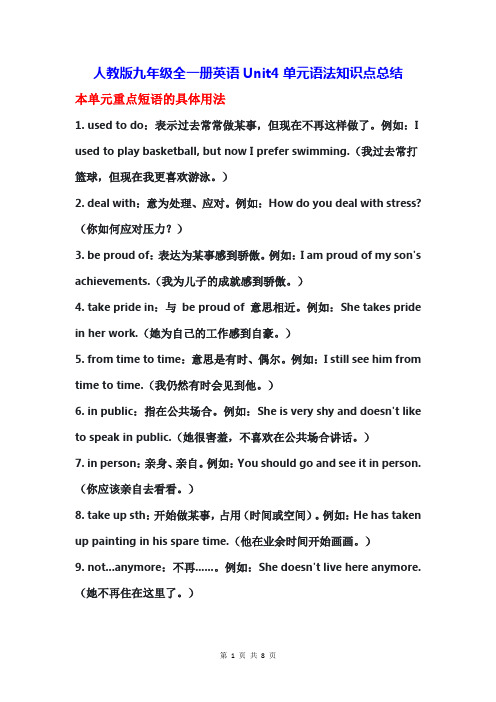
人教版九年级全一册英语Unit4单元语法知识点总结本单元重点短语的具体用法1. used to do:表示过去常常做某事,但现在不再这样做了。
例如:I used to play basketball, but now I prefer swimming.(我过去常打篮球,但现在我更喜欢游泳。
)2. deal with:意为处理、应对。
例如:How do you deal with stress?(你如何应对压力?)3. be proud of:表达为某事感到骄傲。
例如:I am proud of my son's achievements.(我为儿子的成就感到骄傲。
)4. take pride in:与be proud of 意思相近。
例如:She takes pride in her work.(她为自己的工作感到自豪。
)5. from time to time:意思是有时、偶尔。
例如:I still see him from time to time.(我仍然有时会见到他。
)6. in public:指在公共场合。
例如:She is very shy and doesn't like to speak in public.(她很害羞,不喜欢在公共场合讲话。
)7. in person:亲身、亲自。
例如:You should go and see it in person.(你应该亲自去看看。
)8. take up sth:开始做某事,占用(时间或空间)。
例如:He has taken up painting in his spare time.(他在业余时间开始画画。
)9. not...anymore:不再......。
例如:She doesn't live here anymore.(她不再住在这里了。
)10. worry about:担心、担忧。
例如:Don't worry about the exam, just do your best.(不要担心考试,尽力就好。
人教版九年级英语unit4知识点

九年级unit4知识点1.humor n. 幽默humorous adj. 有幽默感的,有趣儿的2. silent adj. 不说话的,沉默的keep silent,保持沉默silence n. 沉默,无声in silence 沉默,无声3. helpful adj. 有用的,有帮助的be helpful to sb 对某人有帮助eg: The book is helpful to the students.4. from time to time 时常, 有时= sometimes = at times5. Asian adj. 亚洲的, 亚洲人的, 亚洲人Asia n. 亚洲6. deal with = do with (deal with用how提问,do with 用what提问)7. shy adj. 害羞的shyness n. 害羞,腼腆8. dare to do sth 敢于做某事eg: We must dare to think speak and act.9. crowd n. 人群, 观众crowded adj. 拥挤的uncrowded adj. 不拥挤的, 人少的10. tons of 许多的,大量的= lots of= a lot of= a number ofeg: She gets tons of male every day.11. private adj. 私人的, 秘密的= personal12. require sb to do sth 要求某人做某事eg: The teacher required the students to be quiet.13. Europe n. 欧洲European adj. 欧州的,欧洲人的, 欧洲人14. Africa n. 非洲African adj. 非洲的, 非洲人的, 非洲人15. give a speech 演说, 演讲eg: They invited him to give a speech.16. in public 公开地eg: It's impolite to speak loudly in public.17. influence v. influnce sb to do sth 影响某人使其做某事influence n. 影响have an influence on sb 对人有影响eg: His idea had a great influence on me.18. be absent from 缺席eg: They were absent from work that day.absent adj. absence n.19. fail to do 未能做某事eg: I failed to pass the driving test.20. in person 亲身, 亲自21. be proud of = take pride in 为...自豪, 感到骄傲。
人教版英语九年级全册单元unit 4 知识点+测试卷+思维导图

Unit 4 I used to be afraid of the dark.1.重点词汇score, background, guard, speech, public, ant, examination, pride, introduction, interview, dare, require, influence, fail, humorous...2. 短语归纳:ed to do 过去常常做2.deal with 对付;应付3.be proud of 为……骄傲,感到自豪4.take pride in 为……感到自豪5.from time to time 时常,有时6.in public 公开地7.in person 亲身,亲自8.take up sth 开始做,接受,占用9.not…anymore 不再10.worry about 为……担忧11.hang out 闲逛12.think about 考虑13.be alone 独处14.on the soccer team 在足球队15.no longer 不再16.make a decision 做决定17.to one’s surprise 令某人吃惊的是18.even though 尽管19.pay attention to 对……注意,留心20.in the last few years 在过去的几年里3. 必背典句:1. I used to be short. 我过去很矮。
2. I didn’t use to be popular in school. 我过去在学校不受欢迎。
3. -You used to be short, didn’t you? 你过去很矮,是吗?-Yes, I did./No, I didn’t. 是的,我是;不,我不是。
4. -Did he use to wear glasses? 他以前戴眼镜吗?-Yes, he did./ No, he didn’t. 是的,他是;不,他不是。
Unit4必背知识点 2021-2022学年人教版英语 九年级全册
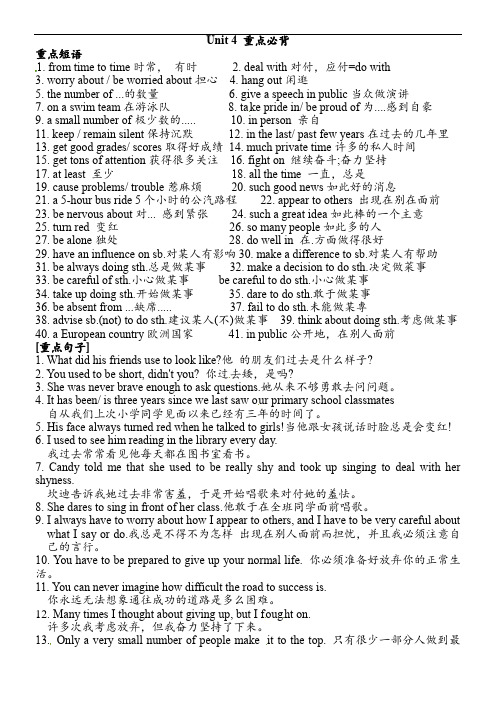
Unit 4 重点必背重点短语1. from time to time时常,有时2. deal with对付,应付=do with3. worry about / be worried about担心4. hang out闲逛5. the number of ...的数量6. give a speech in public当众做演讲7. on a swim team在游泳队8. take pride in/ be proud of为....感到自豪9. a small number of极少数的..... 10. in person 亲自11. keep / remain silent保持沉默12. in the last/ past few years在过去的几年里13. get good grades/ scores取得好成绩14. much private time许多的私人时间15. get tons of attention获得很多关注16. fight on 继续奋斗;奋力坚持17. at least 至少18. all the time 一直,总是19. cause problems/ trouble惹麻烦20. such good news如此好的消息21. a 5-hour bus ride 5个小时的公汽路程22. appear to others 出现在别在面前23. be nervous about对... 感到紧张24. such a great idea如此棒的一个主意25. turn red 变红26. so many people如此多的人27. be alone独处28. do well in 在.方面做得很好29. have an influence on sb.对某人有影响30. make a difference to sb.对某人有帮助31. be always doing sth.总是做某事32. make a decision to do sth.决定做菜事33. be careful of sth.小心做某事be careful to do sth.小心做某事34. take up doing sth.开始做某事35. dare to do sth.敢于做某事36. be absent from ...缺席..... 37. fail to do sth.未能做某專38. advise sb.(not) to do sth.建议某人(不)做某事39. think about doing sth.考虑做某事40. a European country欧洲国家41. in public公开地,在别人面前[重点句子]1. What did his friends use to look like?他的朋友们过去是什么样子?2. You used to be short, didn't you? 你过去矮,是吗?3. She was never brave enough to ask questions.她从来不够勇敢去问问题。
Unit4讲义 人教版英语九年级全册
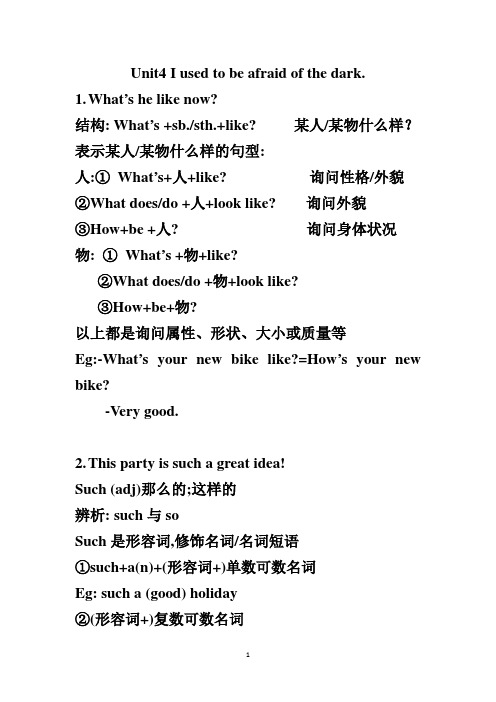
Unit4 I used to be afraid of the dark.1.What’s he like now?结构: What’s +sb./sth.+like? 某人/某物什么样?表示某人/某物什么样的句型:人:①What’s+人+like? 询问性格/外貌②What does/do +人+look like? 询问外貌③How+be +人? 询问身体状况物: ①What’s +物+like?②What does/do +物+look like?③How+be+物?以上都是询问属性、形状、大小或质量等Eg:-What’s your new bike like?=How’s your new bike?-Very good.2.This party is such a great idea!Such (adj)那么的;这样的辨析: such与soSuch是形容词,修饰名词/名词短语①such+a(n)+(形容词+)单数可数名词Eg: such a (good) holiday②(形容词+)复数可数名词Eg: such (beautiful) girls③(形容词+)不可数名词Eg: such (delicious) foodSo是副词,修饰形容词/副词Eg: so careful so carefully注意: 当名词前有many,much,few,little 等词修饰时,只能用so,不能用such.Eg: She will have so much housework to do tomorrow Such+a(n)+adj+可数名词单数=so+adj+a(n)+可数名词单数Eg:It is so interesting a book that I like it very much. It is such an interesting book that I like it very much.3.As she got better,she dared to sing in front of her class,and then for the whole school.dare (实义动词) 敢于;胆敢(可以有词形变化) Eg: I wonder how he dares to say such things.dare(情态动词) 敢(通常用于疑问句/否定句及if/whether之后,一般不用于肯定句)Eg:Dare you tell her the truth?I don’t know whether he dare try.“I dare say”习惯说法(用于肯定句) 所表示的是一种不确定的语气,常译为:很可能、大概、我想等Eg: I dare say you are right. 我想你是正确的4.Now she’s not shy anymore and loves singing in front of crowds.Not...anymore=not...any more 相当于no more(一般指行为/动作不再出现)辨析: not...any more 与not...any longernot...any more 相当于no more,表示数量和程度上的“不再”,通常修饰非延续性动词,一般指今后“不再”,故多用于将来时Eg: He will not go there any more.He will no more go there.not...any longer 相当于no longer 指时间上/距离上的“不再延长”,通常修饰延续性动词,多指现在的情况与过去相比,故常用于现在时态Eg: You can’t stay here any longer.You can no longer stay here.5.You really require a lot of talent and hard work to succeed.require (v) 需要;需求requirement (n)要求;规定用法如下:①require sb.to do sth. 要求某人做某事②require that+sb.(should) do sth. 要求某人做某事③sth. require doing /to be done.某事需要(被)做6.Only a very small number of people make it to the top.a very small number of 极少数后接复数名词(谓语动词用复数形式) a small number of 少数辨析: a number of 与the number ofa number of +复数名词许多the number of +复数名词...的数量(谓语用单数) 7.Sometimes he was absent from classes and failed his examinations.absent (adj) 缺席的;不在场的(常与from连用) be absent from 缺席absence (n) 缺席(反义词: presence )present(adj)出席的;在场的(后置定语)(adj)目前的;现在的(前置定语)fail (vt) 失败;不及格(vi) 失败;不及格~ to do sth. 未能/没能做成某事Eg: The boy didn’t fail (in) the exam.8.She advised them to talk with their son in person. advise sb. (not) to do sth. 建议某人(不)做某事advise的用法如下:①~doing sth. 建议做某事②~ that +从句建议... (that引导的从句应用虚拟语气,即:should+动原,should可以省略)advice(un) 建议;忠告 a piece of advice 一条建议9.So he became less interested in studying and missed classes.辨析: become,turn与getbecome:变得;成为(通常指身份、职位的变化,强调变化的过程已完成)Eg: She became an English teacher.turn: 变成(多用于在颜色或性质等方面的变化,强调变化的结果)Eg: The man turned blue with fear. (那个人吓得脸色发青)get:变得(多用于口语,表示一种变化过程,强调“渐渐变得”, 其后常接adj的比较级)Eg: In winter,the days get shorter.Used to的用法:used to+动原表示过去的习惯性动作或状态,现在已不再发生或不存在.否定句: used not to, usedn’t to, didn’t use toEg: She didn’t use to have long hair.She usedn’t to have long hair.一般疑问句: Did e to...? /Used sb.to...?Yes,sb.did. /Yes,ed to. No,edn’t 反意疑问句: 附加问句部分可用didn’t/usedn’t类似短语:be/get/become used to doing sth.习惯于做某事be used to do sth. 被用于做某事。
人教版九年级英语unit4语法知识点

人教版九年级英语unit4语法知识点人教版九年级英语Unit 4语法知识点在英语学习中,语法是非常重要的一部分。
掌握语法知识可以帮助我们正确理解和运用英语。
本文将介绍人教版九年级英语Unit 4的语法知识点,帮助大家更好地学习和应用。
一、现在完成时现在完成时用来表示过去发生的动作对现在的影响或结果。
它的结构是主语 + have/has + 过去分词。
例句:1. I have finished my homework.(我已经完成作业。
)2. He has gone to the supermarket.(他已经去超市了。
)我们可以使用现在完成时来描述过去发生的事情对当前状态的影响。
比如 "I have lost my key."(我丢了我的钥匙)表示我现在没有钥匙。
二、情态动词情态动词用来表示说话者对某个动作或状态的态度、可能性、允许性等。
常见的情态动词有 can, could, may, might(可以)、must(必须)、shall, should(应该)、will, would, need等。
例句:1. You can go to the party.(你可以去参加派对。
)2. He must finish his homework before playing games.(他必须先做完作业再玩游戏。
)情态动词有一些特点:后面接动词原形,表示客观的态度或可能性;情态动词本身没有人称和数的变化;句子中情态动词和动词基本形的变化最小。
三、虚拟语气虚拟语气用来表示非真实或假设的情况。
在条件从句中,用虚拟语气来表示可能不会实现的愿望、假设或建议等。
常见的虚拟语气形式有:would/could/might +动词原形。
例句:1. If I were a bird, I would fly in the sky.(如果我是一只鸟,我会在天空飞翔。
)2. I wish I could go with you.(我希望我能和你一起去。
人教版九年级上册英语unit4单词知识点
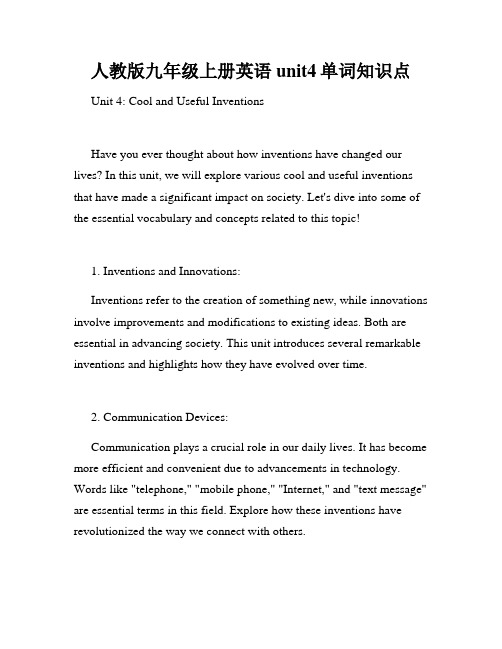
人教版九年级上册英语unit4单词知识点Unit 4: Cool and Useful InventionsHave you ever thought about how inventions have changed our lives? In this unit, we will explore various cool and useful inventions that have made a significant impact on society. Let's dive into some of the essential vocabulary and concepts related to this topic!1. Inventions and Innovations:Inventions refer to the creation of something new, while innovations involve improvements and modifications to existing ideas. Both are essential in advancing society. This unit introduces several remarkable inventions and highlights how they have evolved over time.2. Communication Devices:Communication plays a crucial role in our daily lives. It has become more efficient and convenient due to advancements in technology. Words like "telephone," "mobile phone," "Internet," and "text message" are essential terms in this field. Explore how these inventions have revolutionized the way we connect with others.3. Transportation Advancements:The transportation sector has seen significant improvements throughout history. From the invention of the wheel to the development of electric vehicles, transportation has become faster and greener. Essential terms such as "airplane," "bicycle," "subway," and "spacecraft" will help us better understand this area.4. Medical Breakthroughs:Medical inventions have saved countless lives and transformed healthcare practices. Recognize terms such as "vaccine," "antibiotics," "MRI," and "prosthetics." Discover how these innovations have extended human lifespan and enhanced the quality of life.5. Environmentally Friendly Inventions:With rising environmental concerns, the importance of eco-friendly inventions cannot be overlooked. Terms such as "solar energy," "wind power," "recycling," and "biodegradable" are crucial in this context. Learn how these inventions contribute to a sustainable future.6. Everyday Household Inventions:Our homes are filled with various inventions that make our lives more comfortable and efficient. Terms such as "refrigerator," "washingmachine," "microwave," and "dishwasher" are essential when discussing daily household tasks. Explore how these inventions have simplified our daily routines.7. Entertainment and Multimedia:Entertainment has evolved with the advent of new technologies. Terms like "television," "video game," "virtual reality," and "streaming" have become integral to our leisure activities. Discover how these inventions have shaped our entertainment preferences.8. Technological Advancements:Technology is rapidly advancing, bringing about transformative changes in society. Familiarize yourself with terms such as "robotics," "artificial intelligence," "augmented reality," and "nanotechnology." Explore how these advancements are shaping various industries.9. Patents and Copyrights:Protecting the rights of inventors is crucial to encourage innovation and creativity. Understand the terms "patent" and "copyright" and their significance in safeguarding intellectual property. Learn how inventors can secure their innovative ideas.In conclusion, this unit explores a wide range of inventions that have significantly impacted our lives. By understanding the vocabulary and concepts related to these inventions, we gain a deeper appreciation for the constant progress in various fields. As we continue to innovate, who knows what remarkable inventions the future holds?。
人教版英语九年级Unit4单元知识点归纳
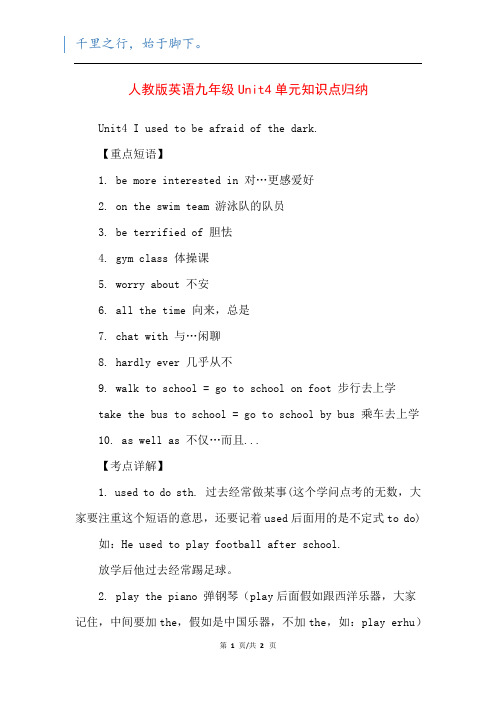
人教版英语九年级Unit4单元知识点归纳
Unit4 I used to be afraid of the dark.
【重点短语】
1. be more interested in 对…更感爱好
2. on the swim team 游泳队的队员
3. be terrified of 胆怯
4. gym class 体操课
5. worry about 不安
6. all the time 向来,总是
7. chat with 与…闲聊
8. hardly ever 几乎从不
9. walk to school = go to school on foot 步行去上学
take the bus to school = go to school by bus 乘车去上学
10. as well as 不仅…而且...
【考点详解】
1. used to do sth. 过去经常做某事(这个学问点考的无数,大家要注重这个短语的意思,还要记着used后面用的是不定式to do) 如:He used to play football after school.
放学后他过去经常踢足球。
2. play the piano 弹钢琴(play后面假如跟西洋乐器,大家
记住,中间要加the,假如是中国乐器,不加the,如:play erhu)。
初中英语 人教版 九年级全一册 Unit 4 知识点
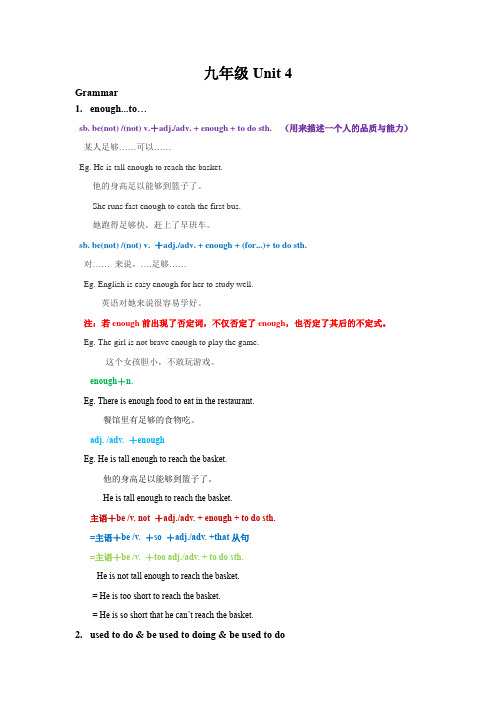
九年级Unit 4Grammar1.enough...to…sb. be(not) /(not) v.+adj./adv. + enough + to do sth. (用来描述一个人的品质与能力)某人足够……可以……Eg. He is tall enough to reach the basket.他的身高足以能够到篮子了。
She runs fast enough to catch the first bus.她跑得足够快,赶上了早班车。
sb. be(not) /(not) v. +adj./adv. + enough + (for...)+ to do sth.对…… 来说,….足够……Eg. English is easy enough for her to study well.英语对她来说很容易学好。
注:若enough前出现了否定词,不仅否定了enough,也否定了其后的不定式。
Eg. The girl is not brave enough to play the game.这个女孩胆小,不敢玩游戏。
enough+n.Eg. There is enough food to eat in the restaurant.餐馆里有足够的食物吃。
adj. /adv. +enoughEg. He is tall enough to reach the basket.他的身高足以能够到篮子了。
He is tall enough to reach the basket.主语+be /v. not +adj./adv.+ enough+ to do sth.=主语+be /v. +so +adj./adv.+that从句=主语+be /v. +too adj./adv.+ to do sth.He is not tall enough to reach the basket.= He is too short to reach the basket.= He is so short that he can’t reach the basket.ed to do & be used to doing & be used to doused to do sth. 过去常常做某事(现在不做了)主语适用于各种人称。
人教版九年级英语第四单元知识点总结
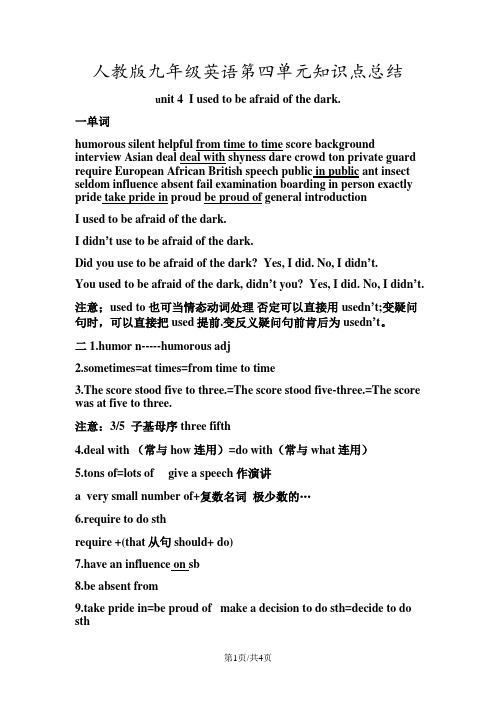
人教版九年级英语第四单元知识点总结u nit 4 I used to be afraid of the dark.一单词humorous silent helpful from time to time score background interview Asian deal deal with shyness dare crowd ton private guard require European African British speech public in public ant insect seldom influence absent fail examination boarding in person exactly pride take pride in proud be proud of general introductionI used to be afraid of the dark.I didn’t use to be afraid of the dark.Did you use to be afraid of the dark? Yes, I did. No, I didn’t.You used to be afraid of the dark, didn’t you? Yes, I did. No, I didn’t.注意;used to 也可当情态动词处理否定可以直接用usedn’t;变疑问句时,可以直接把used提前.变反义疑问句前肯后为usedn’t。
二1.humor n-----humorous adj2.sometimes=at times=from time to time3.The score stood five to three.=The score stood five-three.=The score was at five to three.注意:3/5 子基母序 three fifth4.deal with (常与how连用)=do with(常与what连用)5.tons of=lots of give a speech 作演讲a very small number of+复数名词极少数的…6.require to do sthrequire +(that从句 should+ do)7.have an influence on sb8.be absent from9.take pride in=be proud of make a decision to do sth=decide to do sthgive a general self-introduction fail the exam10.What’s sb like?(问外貌+性格)What does sb look like?(只问外貌)11.be on a swim team. get good grades on one’s exams12.such+a/an +adj+ n=so +adj +a/an+ n so+ adj/adv13.It has been three years since we last saw our primary school classmates.现在完成时标志词;since+时间点 for+ 时间段 in the last few years already yet ever so faruntil now recently these days/weeks/years注意:since后为一般过去时,主句用现在完成时have/has done ed to do sth 过去常常干某事be/get used to doing sth 习惯于干某事 be used to do sth=be used for doing sth 被用来做某事15.see/notice/ watch/look at/hear/listen to+ do(全过程)/ doing(正在做)16.take up1)从事,开始+doing sth He left a job in the city to take up farming.2)占据 The table takes up too much room.3)继续I put the telephone down and took up the work again.17.dare to do sth敢于做某事have to do sth 必须做某事(客观)=must do sth(主观)18.She is not shy anymore.=she is shy no more.not …anymore=no more(not置于be/助动词/情态动词之后)(no more通常置于句末)19.be able to=can能够 to one’s surprise令某人吃惊的是 to one’s +n pay attention to+ doing sth .....对做某事关注adj+ enough to do sth 足够…而能够做某事20.too much+ U/ too many+ C复太多的…..much too +adj 太….21.appear/disappear hang out with sbbe ready to do sth=prepare to do sth give up doing sth the roadto the successbooks on sth(关于….的书) at least/at mostwalk to school=go to school on foot wear the school uniforms all the timebe nervous about sth22.have difficulties/problems (in) doing sth23.cause problems另;使某人干某事 cause/get sb to do sth have/let/make sb do sth注意;变被动do要变成to do24.lonely 主观上孤单alone客观上一个人25.finally=at last=in the endbe afraid of doing sth=be terrified of doing sth=be afraid to do sth=be terrified to do sth26.advise sb to do sth/advise doing/advice that( shoud do)27.in person 亲自 even though=even if=although=though28.They are always thinking of me.be always doing sth常表达说话人的某种情绪。
人教版英语九年级Unit4单元知识点归纳

人教版英语九年级Unit4单元知识点归纳Unit 4: I Used to Be Afraid of the DarkWhen I was younger。
I used to be afraid of the dark。
Iwould always worry about what was XXX were under my bed orin my closet。
I would always sleep with a XXX.Despite my fear of the dark。
I was on the swim team and loved being in the water。
I also enjoyed gym class and being active。
I was more interested in sports than in reading or watching TV.I hardly ever walked to school。
I would always take the bus。
even though my school was not far from my house。
I would chat with my friends on the bus ride to school.As I got older。
my fear of the dark slowly went away。
I realized that there was nothing to be afraid of and that the dark wasjust a natural part of life。
Now。
I can sleep without a nightlight and am not afraid of the dark anymore.Looking back。
I realize that my fear of the dark was just a phase that I went through。
Unit4重要知识点讲解人教版九年级英语

Unit4 I used to be afraid of the dark.重要知识点讲解Section A_Grammar Focus_Section B_综合Section A一、used to do sthI used to be afraid of the dark.我以前怕黑。
[点拨]"used to do sth."意为“过去常常做某事”;表示过去经常性或习惯性的动作或状态,暗指现在已经不存了,强调过去与现在的对比。
used to的否定形式有两种:didn’t use to或us edn’t toMrs Brown didn’t use to / usedn’t to travel in summer.布朗夫人过去夏天不旅游。
used to用于疑问句时,要借助助动词did,也可以将used提到主语前。
Did you use to/Used you to play the guitar? 他过去弹吉他吗?Grammar Focus一、某人描述过去某一状态的表达I used to be short.我以前矮。
[点拨]"主语+used to be+形容词."用于某人描述过去某一状态。
二、used to的句式变化[点拨]1.否定句:主语+didn’t use to/usedn’t to do sth.2.一般疑问句:Did+ 主语+ use + to do…?答语:Yes, sb did./No, sb didn’t.Did he use to wear glasses? 他以前戴眼镜吗?Yes,he did.是的,他戴。
3.反意疑问句:主句+ didn’t+人称代词?You used to be short, didn't you?你以前很矮,不是吗?Section B重点短语和表达boarding school寄宿学校in person 亲自be proud of=take pride in 为...感到自豪make a decision 做决定be absent from 缺席look after=take care of 照顾;照看单元综合:1.quiet/calm/silent/still/peaceful这些形容词均含“平静的,无声无息”之意。
人教版英语九年级Unit 4 重点知识归纳讲解

Unit 4 I used to be afraid of the dark. 知识清单Section A一、重要短语:1. 几天a couple of days2. 在课堂上保持沉默be silent in class3. 在游泳队on the swim team4. 过去很幽默used to be humorous5. 回答问题不够大胆be not brave enough to answer questions6. 对运动更感兴趣be more interested in sports7. 不时,有时from time to time8. 一些给年轻人的建议some advice to young people9. 在他考试中获得高分get good scores on his exam(s)10. 采访一个18岁的亚洲名星interview an 18-year-old Asian pop star11. 吸引无数目光get tons of attention12.有很多个人时间have much private time13. 我身边的警卫guards around me14. 放弃正常生活give up normal life15. 通向成功的路the road to success16. 害怕孤独be afraid of being alone17. 需要很多才能和艰苦的工作获得成功need a lot of talent and hard work to succeed18. 在大庭广众下演讲give a speech in public19. 读关于欧洲历史和非洲文化的书read books on European history and African culture20. 教我们英式英语teach us British English21. 到达成功的顶峰make it to the top二. 知识讲解Section A1. Mario used to be short. He used to wear glasses. 玛里奥过去个子矮。
Unit4 知识点背诵2023-2024学年人教版九年级英语全册
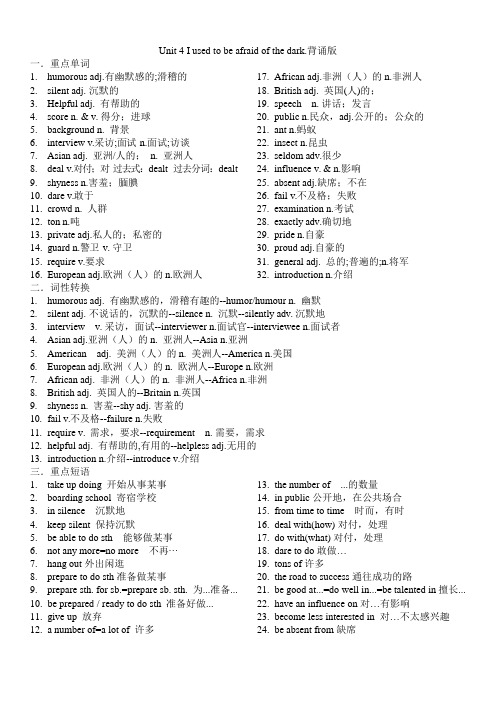
一.重点单词Unit 4 I used to be afraid of the dark.背诵版1.humorous adj.有幽默感的;滑稽的2.silent adj. 沉默的3.Helpful adj. 有帮助的4.score n. & v. 得分;进球5.background n. 背景6.interview v.采访;面试n.面试;访谈n adj. 亚洲/人的;n. 亚洲人8.deal v.对付;对过去式:dealt 过去分词:dealt9.shyness n.害羞;腼腆10.dare v.敢于11.crowd n. 人群12.ton n.吨13.private adj.私人的;私密的14.guard n.警卫v. 守卫15.require v.要求16.European adj.欧洲(人)的n.欧洲人二.词性转换17.African adj.非洲(人)的n.非洲人18.British adj. 英国(人)的;19.speech n. 讲话;发言20.public n.民众,adj.公开的;公众的21.ant n.蚂蚁22.insect n.昆虫23.seldom adv.很少24.influence v. & n.影响25.absent adj.缺席;不在26.fail v.不及格;失败27.examination n.考试28.exactly adv.确切地29.pride n.自豪30.proud adj.自豪的31.general adj. 总的;普遍的;n.将军32.introduction n.介绍1.humorous adj. 有幽默感的,滑稽有趣的--humor/humour n. 幽默2.silent adj. 不说话的,沉默的--silence n. 沉默--silently adv. 沉默地3.interview v. 采访,面试--interviewer n.面试官--interviewee n.面试者n adj.亚洲(人)的n. 亚洲人--Asia n.亚洲5.American adj. 美洲(人)的n. 美洲人--America n.美国6.European adj.欧洲(人)的n. 欧洲人--Europe n.欧洲7.African adj. 非洲(人)的n. 非洲人--Africa n.非洲8.British adj. 英国人的--Britain n.英国9.shyness n. 害羞--shy adj. 害羞的10.fail v.不及格--failure n.失败11.require v. 需求,要求--requirement n. 需要,需求12.helpful adj. 有帮助的,有用的--helpless adj.无用的13.introduction n.介绍--introduce v.介绍三.重点短语1.take up doing 开始从事某事2.boarding school 寄宿学校3.in silence 沉默地4.keep silent 保持沉默5.be able to do sth 能够做某事6.not any more=no more 不再···7.hang out 外出闲逛8.prepare to do sth 准备做某事9.prepare sth. for sb.=prepare sb. sth. 为...准备...10.be prepared / ready to do sth 准备好做...11.give up 放弃12.a number of=a lot of 许多13.the number of ...的数量14.in public 公开地,在公共场合15.from time to time 时而,有时16.deal with(how) 对付,处理17.do with(what) 对付,处理18.dare to do 敢做…19.tons of 许多20.the road to success 通往成功的路21.be good at...=do well in...=be talented in 擅长...22.have an influence on 对…有影响23.become less interested in 对…不太感兴趣24.be absent from 缺席25.fail the examination 考试不及格26.fail to do sth 未能成功做某事27.in person 亲自28.take pride in 以…为骄傲29.be proud of 以…为骄傲30.pay attention to (doing)对(做)……留心31.give a speech 发表演讲ed to do sth. 过去常常做33.get/be used to sth./doing sth. 习惯于… 四.重点句子34.be used to do 被用于做…(被动语态)35.find it difficult to do sth 发现做某事是困难的36.have difficulties in doing 做. 有困难37.the whole school =all the school 整个学校38.be famous for+原因因而著名39.be famous as+身份/作品作为. 而出名40.worry about ... / be worried about ... 担心41.fight on 奋力坚持下去;继续战斗42.require sb to do sth 要求某人做某事1.It has been three years since we last saw our primary school classmates.自从我们上次见到我们的小学同学已经3 年了。
人教版九年级英语Unit4重点知识归纳

Unit4 I used to be afraid of the dark重点知识归纳一、词汇应用1.be silent in class在课堂上保持沉默2.be interested in ... 对……感兴趣3.on a basketball team 在篮球队4.from time to time 时常;有时5.turn red 变红6.get good scores on the exams 在考试中取得好成绩7.wear glasses 戴眼镜8.take up singing 开始唱歌9.deal with her shyness 克服她的羞怯10.not ... anymore 不再……11.in front of crowds 在众人面前12.all the time 频繁;反复13.get tons of attention 被众人所关注;吸引无数目光14.worry about ... / be worried about ... 担心……;担忧……15.be careful about ... 对……小心16.give up your normal life 放弃你正常的生活17.the road to success 成功之路18.fight on 奋力坚持下去;继续战斗19.require a lot of talent and hard work 需要很大的天赋和勤奋20.make it to the top 成功21.give a speech 发表演讲22.in public 公开地;在别人面前23.be nervous about tests 考试紧张24.do well in school 在学校表现好25.cause problems 制造麻烦26.take care of sb. 照顾某人27.influence his schoolwork 影响他的学业28.be absent from classes 缺课;缺勤29.fail his examinations 他考试不及格30.in person 亲身;亲自31.even though 即使;虽然32.think of sb. 想起某人33.become active in many other activities在许多别的活动中变得积极34.send sb. to a boarding school 将某人送到一所寄宿学校35.dare to do sth. 敢做某事36.make the decision to do sth. 决定做某事37.advise sb. to do sth. 建议某人做某事二、重点句型1.I used to be afraid of the dark.我过去常常前害怕黑暗.2.I go to sleep with my bedroom light on.我开着卧室的灯睡觉.3.I used to spend a lot of time playing games with my friends.以前我常常花很多时间和我的朋友们玩游戏.4.I hardly ever have time for concerts.我几乎没有时间去听音乐会.5.My life has changed a lot in the last few years.我的生活在过去几年里改变了很多.6.It will make you stressed out.那会使你紧张的.7.It seems that Yu Mei has changed a lot.玉梅似乎变化很大.三、词汇讲解1. silentsilent是形容词,意为“沉默的;无言的”,其名词形式为silence。
人教版英语九年级Unit 4总结

Unit 4 I used to be afraid of the dark.名词Nouns1. background 背景e.g.: Can you give me more background on the company?2. shyness害羞;腼腆e.g.: Rudeness is just a front for her shyness.3. crowd人群;观众e.g.: Now she’s not shy anymore and loves singing in front of crowds.4. ton 吨(pl.) 大量;许多e.g.: I didn’t use to be popular in school, but now I get tons of attention wherever I go.5. speech 讲话;发言e.g.: This expression is used mainly in speech, not in writing.6. ant 蚂蚁e.g.: The ant is a social insect.7. insect昆虫e.g.: Many kinds of insect find their mates by scent.8. examination考试;审查e.g.: If you are always absent from classes, you will fail the examinations.9. pride自豪;骄傲– take pride in 为……感到自豪e.g.: They take pride in everything good that I do.10. introduction介绍e.g.: Our speaker today needs no introduction.动词Verbs1. deal (dealt, dealt)对付;对待– deal with 应对;处理e.g.: Candy told me that she used to be really shy and took up singing to deal with her shyness.2. dare敢于;胆敢e.g.: As she got better, she dared to sing in front of her class, and then for the wholeschool.3. require需要;要求e.g.: Students are required to be in school by 8:30.4. fail不及格;失败;未能(做到)e.g.: He failed his driving test three times.形容词Adjectives1. humorous 有幽默感的;滑稽有趣的e.g.: He was quite humorous, and I liked that about him.2. silent不说话的;沉默的e.g.: She was always silent in class.3. helpful有用的;有帮助的e.g.: The people I spoke to were very helpful.4. private私人的;私密的e.g.: And I don’ t have much private time anymore.5. British英国(人)的e.g.: American English is significantly different from British English.6. absent缺席;不在e.g.: Sometimes he was absent from classes and failed his examinations.7. proud自豪的;骄傲的– be proud of 为……骄傲;感到自豪e.g.: Tina played very well in the basketball game and her parents are proud of her.副词Adverbs1. seldom不常;很少e.g.: When he was a little boy, he seldom caused any problems, and his family spent a lot of time together.2. exactly确切地;精确地e.g.: It was exactly what I needed.兼类词Words with multiple part of speech1. score n. & v. 得分;进球e.g.: You get an A grade for scores of 75 and over.2. interview v. 采访;面试n. 面试;访谈e.g.: For this month’s Young World magazine, I interviewed 19-year-old Asian pop star Candy Wang.3. Asian adj.亚洲(人)的n.亚洲人e.g.: There were two little girls, one Asian and one with blonde hair.4. guard n.警卫;看守v.守卫;保卫e.g.: Hanging out with friends is almost impossible for me now because there are always guards around me.5. European adj.欧洲(人)的n.欧洲人e.g.: The report is based on data from six different European cities.6. African adj. 非洲(人)的n.非洲人e.g.: Drums are basic to African music.7. public n.民众adj.公开的;公众的– in public 公开地;在别人(尤指生人)面前e.g.: We are here to provide the public with a service.8. influence v. & n.影响e.g.: Li Wen’s unhappiness began to influence his schoolwork.9. general adj.总的;普遍的;常规的n.将军e.g.: The exhibition is not open to the general public.短语Expressions1. from time to time时常;有时e.g.: She has to work at weekends from time to time.2. boarding school寄宿学校e.g.: Finally, Li Wen’s parents made the decision to send him to a boarding school.3. in person亲身;亲自e.g.: She advised them to talk with their son in person.Grammar Points 语法点1. used toe.g.:I used to be short. I didn’t use to be popular in school. Paula used to be really quiet. She didn’t use to like tests.You used to be short, didn’t you? Yes, I did. / No, I didn’t.Did he use to wear glasses? Yes, I did. / No, he didn’t.。
人教版九年级英语Unit4单元知识点课件
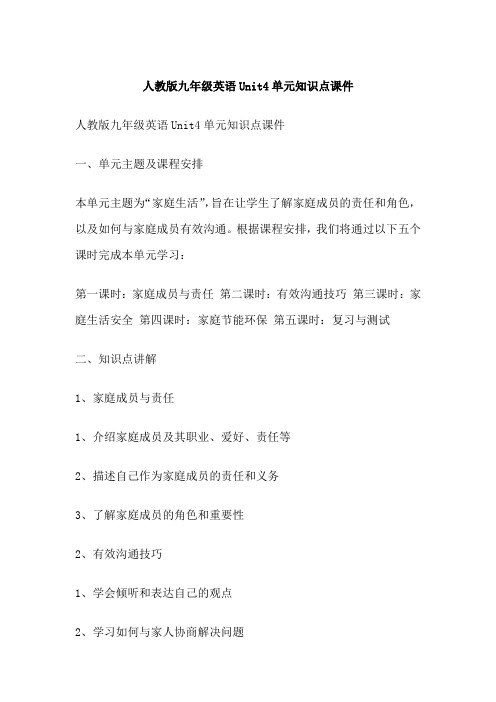
人教版九年级英语Unit4单元知识点课件人教版九年级英语Unit4单元知识点课件一、单元主题及课程安排本单元主题为“家庭生活”,旨在让学生了解家庭成员的责任和角色,以及如何与家庭成员有效沟通。
根据课程安排,我们将通过以下五个课时完成本单元学习:第一课时:家庭成员与责任第二课时:有效沟通技巧第三课时:家庭生活安全第四课时:家庭节能环保第五课时:复习与测试二、知识点讲解1、家庭成员与责任1、介绍家庭成员及其职业、爱好、责任等2、描述自己作为家庭成员的责任和义务3、了解家庭成员的角色和重要性2、有效沟通技巧1、学会倾听和表达自己的观点2、学习如何与家人协商解决问题3、掌握基本的礼貌用语和沟通技巧3、家庭生活安全1、了解家庭安全常识,如防火、防盗等2、学习如何预防家庭事故的发生3、认识家用电器安全隐患及应对措施4、家庭节能环保1、了解家庭能源消耗及环保措施2、学习如何减少家庭能源消耗,如节水、节电等3、认识环保产品及其使用方法三、语法重点及练习1、情态动词的使用:掌握can, may, must等情态动词的用法及区别2、现在完成时的用法:理解现在完成时的构成及用法,如表示过去发生的动作对现在的影响3、介词的使用:掌握in, on, at等介词的用法,如表示时间、地点等四、课堂活动设计1、小组讨论:分组进行,围绕家庭生活安全、节能环保等话题进行讨论,分享自己的经验和看法2、角色扮演:设定家庭生活场景,让学生扮演不同角色,如父母、子女等,进行有效的沟通练习3、课堂提问:鼓励学生提出疑问,通过课堂讨论和教师解答,加深学生对知识点的理解五、课后作业及测试1、完成练习册中本单元相关练习题,巩固课堂所学知识点。
2、写一篇关于“我的家庭生活”的小作文,描述自己在家庭生活中的责任和义务,以及如何与家庭成员进行有效沟通。
3、在课堂上进行单元测试,检测学生对本单元知识点的掌握情况。
六、教学评估与反馈1、通过学生课堂表现、作业完成情况和测试成绩,对学生的学习情况进行评估。
- 1、下载文档前请自行甄别文档内容的完整性,平台不提供额外的编辑、内容补充、找答案等附加服务。
- 2、"仅部分预览"的文档,不可在线预览部分如存在完整性等问题,可反馈申请退款(可完整预览的文档不适用该条件!)。
- 3、如文档侵犯您的权益,请联系客服反馈,我们会尽快为您处理(人工客服工作时间:9:00-18:30)。
人教版九年级英语Unit4 《I used to be afraid of the dark.》知识点1. be more interested in 对…更感兴趣.be interested in =take an interest ina place of interest 名胜2. on the swim team 游泳队的队员.3. be terrified/afraid of 害怕.4. gym class 体操课. P.E.= physical education5. worry about 担心.6. all the time 一直, 总是always7. chat with 与…闲聊chatted8. hardly ever 几乎从不never/seldom9. walk to school =go to school on foot 步行去上学take the bus to school =go to school by bus 乘车去上学第 1 页共12 页10. as well as 不仅…而且as well 同too11. I used to be afraid of the dark. 我过去常常前害怕黑暗.12.I go to sleep with my bedroom light on.我开着卧室的灯睡觉.13. I used to spend a lot of time playing games with my friends. 以前我常常花很多时间和我的朋友们玩游戏.14. I hardly ever have time for concerts. 我几乎没有时间去听音乐会.15. My life has changed a lot in the last/past few years.16. It will make you stressed out. 那会使你紧张的.17. It seems that Yu Mei has changed a lot. 玉梅似乎变化很大.18. used to do sth. 过去常常做某事(这个知识点考的很多,大家要注意这个短语的意思,还要记着used后面用的是不定式to do) 如:He used to play football after school. 放学后他过去常常踢足球。
2. 反意疑问句(反义疑问句遵循这样一个原则,前肯定后否定,前否定后肯定)①肯定陈述句+否定提问如:Lily is a student, isn't she?②否定陈述句+肯定提问如:She doesn't come from China,does she?第 2 页共12 页③提问部分用代词而不用名词如:Lily is a student, isn't she?④陈述句中含有否定意义的词,如:little, few, never, nothing, hardly等,其反意疑问句用肯定式(对于第四点大家不要忽视,尤其是列举的这几个词,出题的时候经常遇到,对于下面的两个例子大家要仔细看一下,要把这个知识点彻底搞懂)。
如:He knows little English, does he? 他一点也不懂英语,不是吗?They hardly understood it, did they? 他们几乎不明白,不是吗?19. play the piano 弹钢琴(play后面如果跟乐器,大家记住,中间要加the)20. still 仍然,还如:I'm still a student.21. dark 天黑22. on 副词,其反义词off23. walk to somewhere :步行到某处24. spend 动词,表示“花费金钱、时间”(spend和pay for它们的主语都是人,这一点大家要清楚)①spend…on sth. 在某事上花费(金钱、时间)(重要考点)②spend…doing sth. 花费(金钱、时间)去做某事(重要考点,第 3 页共12 页尤其要注意动名词,也就是动词的ing形式,很容易出现在选择题中)如:He spends too much time on clothes. 他花费太多的时间在衣着He spend 3 months building the bridge. 他花费了三个月去建这座桥。
Pay for :花费如:I pay 10 yuan for the book. 我花了10元买这本书。
take : 动词,有“花费”的意思,常用的结构有:take sb. … to do sth. 花费某人多长时间做什么事(在这个用法中,主语经常是it,这一点要清楚,大家仔细看一下下面的例子)。
如:It takes me a day to read the book.25. worry about sb./ sth. 担心某人/某事(重要考点,大多考它的意思), worry 是动词be worried about sb./sth. 担心某人/某事, worried 是形容词如:Don't worry about him. 不用担心他。
Mother is worried about her son. 妈妈担心他的儿子。
26. miss v. 思念、想念、错过第 4 页共12 页27. in the last/past few years. 在过去的几年内,常与完成时连用如:I have lived in China in the last few years. 在过去的几年内我在中国住。
28. be different from 与…不同(常见考点,考的最多的是它的意思,大家只需要记住它的意思,做题的时候具体问题再具体分析即可)the same as be similar to29. how to swim :怎样游泳不定式与疑问词连用:动词不定式可以和what, which, how, where, when 等引导的疑问句连用,构成不定式短语。
如:The question is when to start. 问题是什么时候开始。
I don't know where to go. 我不知道去哪。
30. make sb./ sth. + 形容词make you happymake sb./ sth. + 动词原形make him laughmake sb./ sth. + 动词过去分词make him understood31. move to +地方:搬到某地如:I moved to Beijing last year.第 5 页共12 页32. help sb. with sth. 在某方面帮助某人(注意介词with,在某方面帮助要用这个介词)help sb. (to )do sth. 帮某人做某事(to经常省略)She helped me with English. 她帮助我学英语。
She helped me (to)study English. 她帮助我学习英语。
help out 帮助解决with the help of=with one’s help 在某人帮助下help sb.=give sb. a hand= do sb. a favorhelpful33. fifteen-year-old :作形容词,15岁的。
(有一点要提醒大家,中间的year用的是单数)fifteen years old 指年龄,15岁。
如:a fifteen-year-old boy 一个15岁的男孩34. can't afford to do sth. 支付不起……can't afford sth. 支付不起…如:I can't afford to buy the car.第 6 页共12 页I can't afford the car. 我买不起这个辆小车。
35. as + 形容词/副词+ as sb + could/can 尽某人的…能力如:Zhou run as fast as her could/can. 她尽她最快的能力去跑。
36. get into trouble with 遇到麻烦37. in the end = finally = at last 最后38. make a decision :下决定,下决心39. to one's surprise :令某人惊讶(往往出现在完型中,让我们填surprise)如to their surprise 令他们惊讶to Li Lei's surprise 令李雷惊讶in surprise惊讶地be surprised to do 惊讶地做某事be surprised at sth. 因某事而感到惊讶40. take pride in sth.=be proud of 以…而自豪如:His father always take pride in him. 他的爸爸总是以他而自豪41. pay attention to sth. 对…注意,留心如:第7 页共12 页You must pay attention to your friend. 你应该多注意你的朋友。
42. be able to do sth. 能做某事如:She is able to do it. 她能够做到。
43. give up doing sth. 放弃做某事(注意up后面用的是动词的什么形式)如:My father has given up smoking. 我爸爸已经放弃吸烟了。
44.不再①no more =no longer 如:I play tennis no more.我不再打网球。
②not …any more = not …any longer 如:I don't play tennis any longer. 我不再打网球。
45. go to sleep=fall asleep 入睡46.in public 公开地47.in person 亲身,亲自48.think about 考虑49.be alone 独处50.even though/if 尽管第8 页共12 页51.change one’s life 改变某人的生活52.take care of=look after 照顾53.one of……,……之一54.have to do sth 必须做某事55.try to do sth 尽力做某事try doing尝试做某事try out56.adj+ enough to do sth 足够…而能够做某事57.be prepared to do sth 准备做某事prepare to do58.see sb doing sth 看见某人在做某事see sb. do sth.59.begin to do sth 开始做某事begin doingstart to do sth. start doing60.require sb to do sth 要求某人做某事61.decide to do 决定做某事make a decision to do sth 决定做某事62.It’s hard to believe that …很难相信……63.It +has+been +一段时间+ since+从句自从……以来已经有很多长时间了第9 页共12 页64.dare to do sth 敢于做某事65.It’s adj+ for/of sb+ to do sth对某人来说做某66. 辨析:used to do sth. 过去常常做…get/be used to sth./doing sth. 习惯于…be used to do 被用于做…(被动语态)be used by 由(被)…使用(被动语态)be used as … 被当做…使用(被动语态)be used for doing被用于做…(被动语态)例: I used to go to work by bus. Now I take a taxi.He used to be a problem boy. She used to be very shy. I’m used to drinking a cup of water after meal.He’s been used to living in the d ormitory.A hammer is used to drive nails.This machine is used to clean the floor.The girl is being used as a servant in the house.第10 页共12 页A knife can be used for cutting bread.2) afford(支付得起)的用法afford sth 买得起…… afford to do sth 有足够的…去做…例:His mother c ouldn’t afford to pay for her child’s education.They did not consider whether they could afford the time or not.We can’t afford to pay such a price. (such和so区别见P110)3) take pride in sth/ sb = be proud of sth/ sb 为…感到自豪例:He was watching me and take pride in everything good I do.I take pride in my child. =I’m proud of my child.注:He take pride in everything good I do. 这是一个定语从句。
